Q&A with Shin Fukae: His bass fishing history, life on the road and family time in Japan
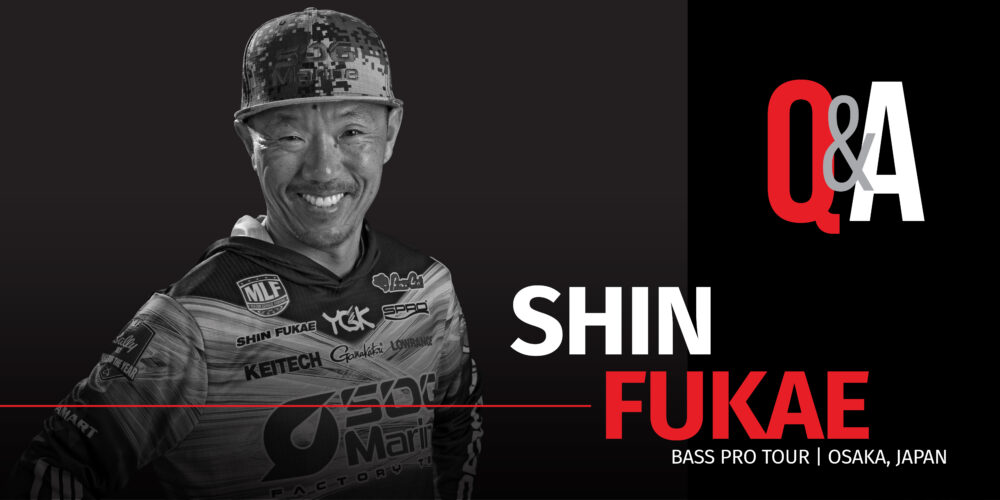
From Japan to the U.S., MLF pro Shin Fukae has accomplished a lot in the fishing world and continues to turn heads with his angling prowess and animated antics. For nearly 20 years, he’s been living out his life’s dream to make a living by competing in bass fishing tournaments in the U.S.
Fukae is looking forward to many more years of continuing to live his dream. Shin, his wife Miyu and their three dogs are on the road so much that they consider their camper to be their home – though they have a house in Georgia, as well. The Fukaes took time out of a recent trip to Japan to chat with MLF about fishing, life, and the importance of finding good sushi.
How did you get into fishing and what’s your earliest fishing memory?
SF: My brother and dad took me fishing for bluegill and little fish when I was a kid. I didn’t know there was bass in my home river in Osaka. I accidentally caught a bass when I was 8 years old, it was about 3 pounds on a Jitterbug.
How did you get into fishing competitively?
SF: I joined the junior high fishing club and started competitions, then it was high school fishing. I was watching a fishing video when I was 13 or 14 years old and then dreamed about being a professional fisherman in the U.S. But I didn’t have enough money, so I decided to fish in Japan when I was 18 years old with a 9.9 horsepower boat (it was only 12 feet long).
When was your first pro fishing tournament and what was it like?
SF: There was the Japan Bass Tournament Association, it was at Lake Biwa in Japan. It was fun, but I didn’t win. But after a couple of years, I won an open tournament like the Toyota Series.
You started a guide service at 24 years old in 1996. What kind of fishing trips did you guide?
SF: It was to make money to come to the U.S. to compete. But before I went to the U.S., I first met Charlie Evans and Kathy Fennel when they came to Japan, and I guided them on Lake Biwa in like 2002 or so.
How did your family react when you decided to go pro?
SF: My dad (Yoriyuki) was so mad! He didn’t think I could do that. I was working with Mitsubishi Motors and I couldn’t quit fishing, so I decided to do some guiding. Dad didn’t like it, but I quit Mitsubishi after two years or so. Dad wanted me to have a steady blue-collar 9-to-5 salary job, something with consistency – and fishing is a gamble. Now he’s proud of me, I think.
You’ve been on Japanese magazine covers and in some videos, too. What was your pro-fishing experience like in Japan?
SF: The fishing industry in Japan is not as big as the U.S. It’s not like being a celebrity but I was a big name in that industry.
Do you go fishing with your wife, Miyu?
MF: Yeah, I used to go fishing with him every day. But we got a bigger camper and dogs, so I stay with them and watch TV in the camper.
SF: She fished Cayuga Lake this year. She knew how good Cayuga is, so she said, “Shin let’s go fishing.”
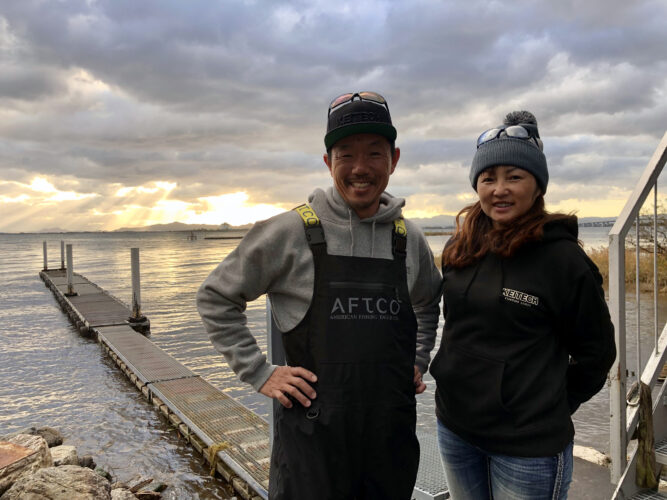
How did you two meet?
MF: We met at the tackle store in Japan. I was working there part-time, and he was a customer and sponsored by that store when we were in our mid-20s. Fishing is what brought us together a couple of years before Shin came to the U.S. He was talking about what he was planning, and I said, “Oh cool, I want to go with him.”
SF: I had enough money to go to the U.S., but she didn’t have any money. I’d never seen a bank account negative before! I asked her, “How will you go to the U.S. if you have a negative account?” She said, “I’ll just follow you.” That was around 2001 or so.
Tell me about your dogs. Do they travel with you to every tournament?
SF: Adam is 16 years old now. He came to us when we were in the U.S. for our third year, so he has almost fished with us for the whole time we’ve been here in the U.S. Leo Jr. and Clover are 2 1/2 years old and they came to us when COVID-19 spread out. They go everywhere with us and enjoy fishing on the boat.
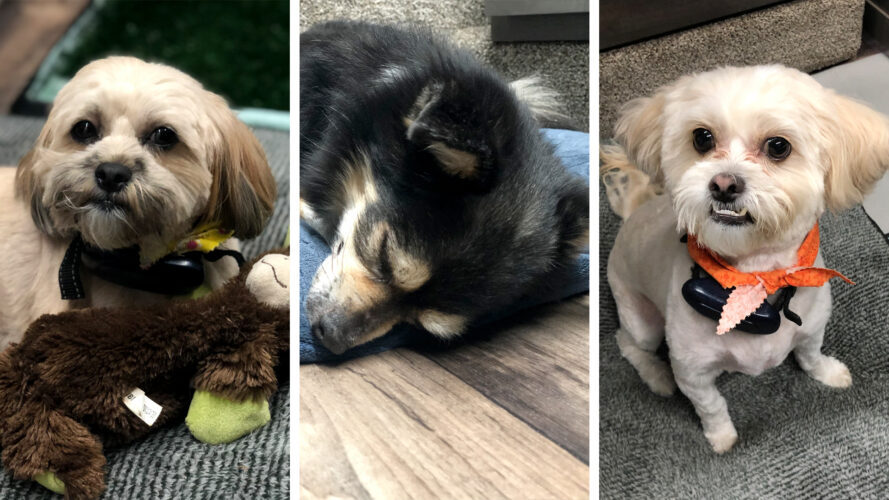
Osaka is known as the “funny” region in Japan. Is that why you’re so humorous on camera during competitions?
SF: Yes! I love to make people laugh. That’s just part of my personality. It’s sort of like in the U.S. where New Yorkers aren’t very friendly but in the South, they’re always laughing and joking. In Japan, in Tokyo, they’re elegant and shy, but Osaka isn’t.
You won Angler of the Year two years in a row in two separate countries, Japan in 2003 and the U.S. in 2004. What was it like?
SF: It was very exciting. My biggest goal is to fish for a long time. It’s been 19 years now and I just want to keep fishing in the U.S. for maybe 30 or 40 years. Angler of the Year was so exciting, but it was just one step. I just want to make some money fishing and winning is just one thing, it’s not everything.
MF: When he came here in 2004, we didn’t know what the AOY means and that it was so big because his first goal was not to win the AOY, he just wanted to fish in the U.S. and compete with the anglers like he was watching.
In your experience, what’s different about competing in Japan and the U.S.?
SF: The lake sizes – in Japan we only have two big lakes. The biggest lake is Lake Biwa, but it’s only one-third the size of Okeechobee. The first time I went to Lake Erie, I was so surprised at how big it is. It felt like the ocean.
Where’s your favorite place to fish and why?
SF: Grass lakes – I love fishing in Okeechobee and the Tennessee River and Chickamauga and places like that. Any lake with grass like Champlain. I caught an 11-pounder during a tournament in Okeechobee (in 2011), that’s the biggest fish for me.
Where do you want to fish the most, but haven’t had a chance to do so yet?
SF: I like to throw big bait, so I want to go to Clear Lake and the California Delta. I want to go to the West Coast. I went to Lake Mead and Lake Powell a long time ago. Maybe next year I will fish the U.S. Open.
What goals are you working toward now?
SF: To keep doing what I’m doing now. Fishing the Bass Pro Tour is one of the best tours and I get to compete against the other top anglers. They’re so strong, so it is super hard to win one tournament, but I’d like to win a couple of them. That format change (for 2023), I hope is good to me with the five biggest ones. I want to see how that will work out for me. I am so excited for that format change.
Out of all your fishing accomplishments, what are you most proud of?
SF: I can’t decide, I’m proud of everything. When I get a big trophy, I might cry. I have a big wall in front of me, but I’m just climbing that big wall right now.
Fishing is a sport where you have to keep learning if you want to continue to succeed. What have you learned recently?
SF: I think the latest is learning how to use a smartphone. Every day I learn something. ActiveTarget is the most recent fishing one. I just wanted the best thing, and I put three ActiveTargets on my boat and the live sonar will be more important for the next couple of years.
If you weren’t a pro angler, what would you be?
SF: I never really thought about it, but I love sports like skateboarding, BMX and snowboarding so maybe I would do something in sports … any kind of sport in the U.S.
Competitive fishing isn’t easy – so what drew you to it and what motivates you to keep going?
SF: I’m always thinking about fishing. If I have a bad tournament, I am always thinking about why I couldn’t get it and how to get better. I think fishing is never-ending. If I won a tournament, I would still want more. As long as I’m thinking about fishing, then that’s the motivation; but when there’s no motivation, then it’s time to retire. I dream about fishing when sleeping, eating, driving – all the time. When I put on underwear, cut hair, cut fingernails, it’s all for fishing. Everything is for the fishing. I could never imagine what life would be like without being a fisherman. When I buy shoes (I wonder) which is better for fishing?
What are you up to now that we’re in a bit of a break between competitions?
SF: We are in Japan right now and we’ll be here for a month. We’re going shopping, eating good sushi and sashimi and we’ll buy the tackle store. There’s a big difference between yen and dollars right now, one dollar is about 150 yen. We will see my family and sponsors and fans, and just eat some good food and relax to get ready for next year before going back to reality in the U.S.
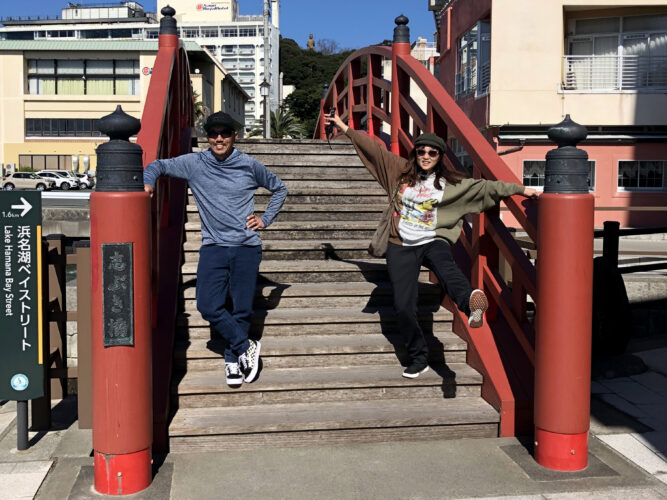
What do you miss most about Japan?
SF: Eating! The food is so good and actually cheap, too. I missed my family, but we FaceTime and can talk to each other so the most missed thing is food.
What do you do for fun when you’re not fishing?
SF: We go golfing, but we’re not very good at it. We came to Mount Fuji because one of my sponsor’s headquarters is here and we went to the hot springs for the sauna. Then in the U.S., I’d like to do some sightseeing because for the last 20 years we didn’t do anything but go fishing from lake to lake.
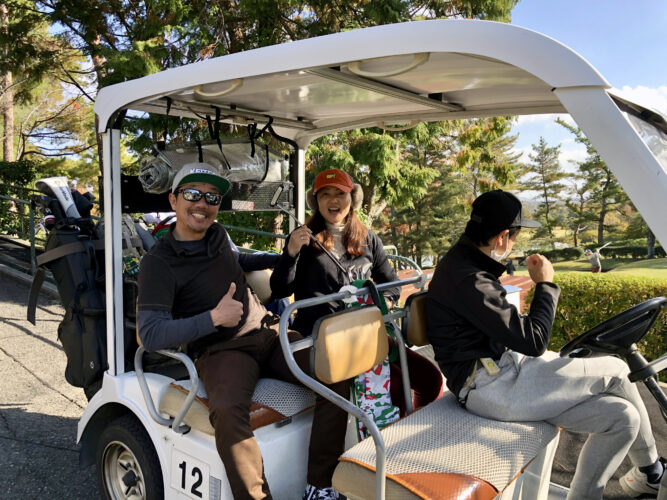
What’s the biggest challenge you’ve encountered in professional fishing and how did you overcome it?
SF: The most important is to listen because of the language barrier. I have broken English, but people are nice and friendly; so I love living in the U.S.
What do you miss most about home (in Thomson, Georgia) when you’re on the road?
SF: Nothing, because we have to mow the grass and stuff. We don’t miss much since we have everything with us. We have the dogs with us and the boat, so there’s nothing to worry about. The camper is home to us. If there’s a tornado or hurricane, we don’t care. We just drive away from it.
Aside from fishing, what’s something you’re really good at?
SF: I am really good at keeping the camper and boat clean. Since everyone is watching me, I am always cleaning and shining things. I love to clean and I’m good at it too.
MF: Shin will be washing a car or boat even if it’s going to rain, it doesn’t make sense to me, but he does it!